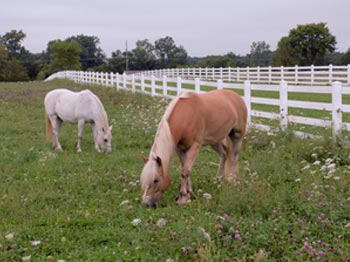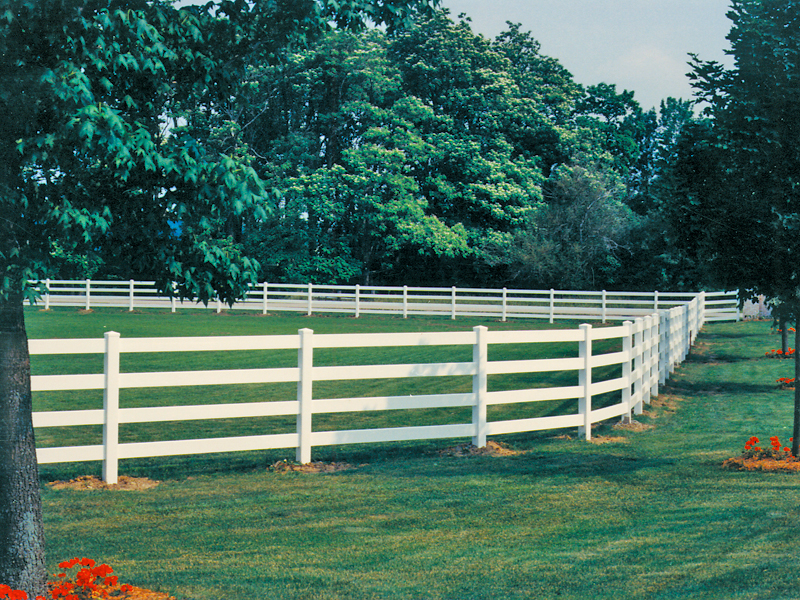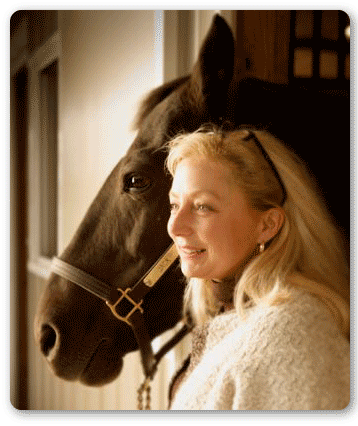What Kind of Fencing Should I Get For My Horse?

You would think that there is a simple answer - “something that will hold them in!” but in reality, most horse owners don’t take the time to ‘do their homework’ and find out the best fencing that will fit their horses' particular needs. The bigger question... how do you justify paying for fencing made specifically for horses rather than a traditional or inexpensive fence? The answer may surprise you and may even completely change the way you look at fencing made specifically for horses. Truth be known, fencing made for horses costs much less than traditional fencing!
Many people like the traditional look of board fencing. Just the thought of white painted board fences dotted with trees and green grass makes your thoughts turn to ‘home sweet home’. But, when you add horses and maintenance into the picture - the end results change. The cost of repairs and painting can be ongoing and disappointing. Low-cost board fencing may look like a tempting, thrifty buy. However, over a life expectancy of 10-15 years, (for wood fence systems used for daily turnout), wood costs far exceed other alternative fence systems made with horses in mind. When you factor in an approximate ‘every 3 years’ board fence maintenance that can include staining, painting, snuggling up to nails and replacing sagging or broken boards...board costs escalate further. We cannot forget that our horses are large animals and that there is a big difference in fencing for residential and home use compared to containing horses. Do you have a cribber, wind sucker, a leaning horse, or one that likes to eat the grass outside of the fence? This kind of wear cannot be compared to a residential fence that may contain a jungle gym for the kids. Board fencing is unable to withstand continued wear or abuse from horses without continued maintenance. Add up the costs of repairs, replacing boards, injury from protruding nails and splintering boards, and the seemingly good value of wood soon becomes more expensive than fences made for horses.
Although bare high-tensile wire was introduced for cattle containment, some horse people found it to be a low-cost fence. As time went on, many horse owners soon found out how dangerous bare high-tensile wire can be with horses. During impact, horses tendons, (even bone), can be cut by the bare high-tensile, even with the electric turned on. Fence repair costs become high, but moreover, losing a horse to a fatal injury can be devastating. With improvement over the years, safer fencing alternatives offer easier choices for horse owners. There are fences made specifically for horses with strong break strengths and forgiving rails that allow both horse and rider safer options. Have your horses ever gotten loose? In the past, most neighbors had their own horses and knew how to handle them. If your horse would accidentally get loose, it would be neighborly to return them back to their owners. Times have changed and neighborhoods have grown around the family farm, people do not know how to handle horses and roads have become busier. Now, more than ever, it is the horse owner’s responsibility to properly contain their horses. By using fencing made for horses, you lessen any chances of accidents and/or court cases from injury.
 There are many fence systems for the horse owner to choose from. Newer PVC fences offer “no maintenance”, but consumers need to know how to install it properly. Since PVC is lightweight, every post needs to be concreted in the ground or even high winds can, over time, move posts. Post movement separates rails inside the post allowing less rail in the post. On impact, rails pop out of the posts easier. The 16’ rails are staggered on the posts allowing the sequence of a ‘solid rail, then two rails butted together in the hollow post, then a solid rail’ and so on. On impact, the hope is that the solid rails will hold in the post if the others pop out. There is a place for PVC on the farm. There is no way to measure its break strength because PVC becomes more rigid in cold weather. It is highly recommended to electrify any PVC fencing that contains horses. Once again the big lesson is to be sure to do your homework and find out all that you can before you decide what fence system will work best for your horses.
There are many fence systems for the horse owner to choose from. Newer PVC fences offer “no maintenance”, but consumers need to know how to install it properly. Since PVC is lightweight, every post needs to be concreted in the ground or even high winds can, over time, move posts. Post movement separates rails inside the post allowing less rail in the post. On impact, rails pop out of the posts easier. The 16’ rails are staggered on the posts allowing the sequence of a ‘solid rail, then two rails butted together in the hollow post, then a solid rail’ and so on. On impact, the hope is that the solid rails will hold in the post if the others pop out. There is a place for PVC on the farm. There is no way to measure its break strength because PVC becomes more rigid in cold weather. It is highly recommended to electrify any PVC fencing that contains horses. Once again the big lesson is to be sure to do your homework and find out all that you can before you decide what fence system will work best for your horses.
Electric fences come in a variety of sizes and types. The fences are usually rated for use alone, with existing fencing, as permanent or temporary fencing. It is best to find out what the fence is made to do – stand-alone or use in conjunction with your existing fence system. Electric fence is a good choice from the standpoint that the horse understands the ‘bite’ of the fence when they come in contact with it. In the world of horses, a pecking order is established. The top horse will ‘stay on top’ by letting the others in the herd know it! Sometimes a bite or a kick is the language used to get the point across to “Stay Away”. Electric fencing has the same effect; it can be very useful in many situations to help to keep your fences better secured. Electric fencing should not be run along any overhead power lines or along water lines areas. There are some applications when it should not be used, for example in small run-in areas or small pastures. The best advice is to take some time to research or ask a fencing expert to help you find the best fence for you and your horses' particular situation.
 The ideal ‘horse fence’ choice is a fence that will be strong enough to allow impacts to gently push the horse (and rider) back from the rail. A fence that needs minimal maintenance with proper installation, is aesthetically pleasing and is ‘made by horse owners for horse owners’. RAMM Flex Fence® is constructed from high-tensile wire and a patented polymer coating, made specifically with horses in mind. Three major reasons for considering this Flex Fence® system is: Flex Fence® rails flex 6"-8" on impact then return to their original shape. They have a very strong break strength (up to 4200 pounds per rail) to withstand the force of large horses and a lifetime ltd. manufactures warranty (longer than any other flexible fence warranty today). The rails are made with 3,12.5-gauge high-tensile wire, the strongest wire made - and are coated with a heavy-duty polymer to form a rail that looks like board fencing. The coated wire rail can be used in combination with the wider rails. This allows the horse owner to ‘mix and match’ the rails into any combination that fits the horse owners' needs. The rail looks like a traditional fence system, giving the aesthetic look of board fencing, without ever having the maintenance and cost of painting. The flexibility allows forgiveness on impact, unlike board fencing. The Flex Fence® series gives additional fence-performance in the 525 Plus Flex Fence® series - denser, thicker, true color to the rail, heavy-duty polymer, and easier one-man installation is possible. When a fence can last 3 times over traditional fence, carries a lifetime LTD warranty, requires little maintenance when installed properly, flexes on impact from the force of a 1,200-pound horse (-plus), and outlasts any rotational fencing by at least doubling its life expectancy - its a ‘given’ as to what fence system will fit your horses needs. Better yet, after 15 years when the wood has to be taken down and replaced, Ramm fences will be standing double that amount of time...if not longer! The cost savings is incredible.
The ideal ‘horse fence’ choice is a fence that will be strong enough to allow impacts to gently push the horse (and rider) back from the rail. A fence that needs minimal maintenance with proper installation, is aesthetically pleasing and is ‘made by horse owners for horse owners’. RAMM Flex Fence® is constructed from high-tensile wire and a patented polymer coating, made specifically with horses in mind. Three major reasons for considering this Flex Fence® system is: Flex Fence® rails flex 6"-8" on impact then return to their original shape. They have a very strong break strength (up to 4200 pounds per rail) to withstand the force of large horses and a lifetime ltd. manufactures warranty (longer than any other flexible fence warranty today). The rails are made with 3,12.5-gauge high-tensile wire, the strongest wire made - and are coated with a heavy-duty polymer to form a rail that looks like board fencing. The coated wire rail can be used in combination with the wider rails. This allows the horse owner to ‘mix and match’ the rails into any combination that fits the horse owners' needs. The rail looks like a traditional fence system, giving the aesthetic look of board fencing, without ever having the maintenance and cost of painting. The flexibility allows forgiveness on impact, unlike board fencing. The Flex Fence® series gives additional fence-performance in the 525 Plus Flex Fence® series - denser, thicker, true color to the rail, heavy-duty polymer, and easier one-man installation is possible. When a fence can last 3 times over traditional fence, carries a lifetime LTD warranty, requires little maintenance when installed properly, flexes on impact from the force of a 1,200-pound horse (-plus), and outlasts any rotational fencing by at least doubling its life expectancy - its a ‘given’ as to what fence system will fit your horses needs. Better yet, after 15 years when the wood has to be taken down and replaced, Ramm fences will be standing double that amount of time...if not longer! The cost savings is incredible.
So which one is best for your horse? When choosing any horse fencing system, be sure to ‘do your homework’ and ask good questions that will help you find a fence system that will work specifically for your horses and their needs. One that will be long-lasting and a safer alternative. What works for one farm, may not work for you because of the many variables with horses, large and small animals that need to be fenced, busy roads vs. tucked in farms. Even though many people will give you good ideas, find a trusted fence expert to help you look at all angles of your project. When you take the time to be sure your fencing system works best for your horses' needs - its the best gift you can give to your equine friends! Their pastures are their “home sweet homes!”
Consider asking the following questions when looking for fencing:
• How long will the fence system that I’m considering last?
• What are my savings by purchasing a fence that is actually made for horses - over traditional fencing?
• What post spacing do I need with my horses? ( 8, 10 or 12’ depending on how large your pasture is or how much use it will get from your horses, it also depends on your soil content)
• How many rails should I use? (rail spacing should be no more than 9-11’s depending on the size of your horse. Closer spacing is needed for mares and foals, ponies and minis).
• Do the rails go on the inside or outside of my posts?
• What kind of posts do I need?
• Is there enough room with the number of horses that I have, to split my pastures for rotational grazing and better pasture maintenance?
• How do I fence for future horses (mares and foals, boarders, etc?)
• What kind of a pasture layout will maximize my horses' living area, and ease my labor to care for them?
• How does my warranty work?
• How hard is the installation? Can I do this fencing myself?
If you have any fencing questions, you can personally talk to Debbie with email. She looks forward to helping you and your horses through safer fencing ‘made with horses in mind’.
 Debbie has over 50 years of experience with horses and equine-related businesses. She has owned, trained, boarded horses and run stables at various times in her career. She is a certified fence installer, has given balanced riding lessons, and has shown horses in Western, Western Pleasure, Trail, English, Hunter/Jumper, Fox Hunting, Hunter Trials, Dressage, and driving classes. Debbie has been involved in foaling, and just about every aspect of horse ownership possible, and she welcomes your questions and comments. If you are interested in using any articles by Debbie, please send her an email.
Debbie has over 50 years of experience with horses and equine-related businesses. She has owned, trained, boarded horses and run stables at various times in her career. She is a certified fence installer, has given balanced riding lessons, and has shown horses in Western, Western Pleasure, Trail, English, Hunter/Jumper, Fox Hunting, Hunter Trials, Dressage, and driving classes. Debbie has been involved in foaling, and just about every aspect of horse ownership possible, and she welcomes your questions and comments. If you are interested in using any articles by Debbie, please send her an email.
RAMM Fence Systems, Inc. makes every effort to provide reliable and useful information on horse health, care, and products. The statements made on this website are based on years of experience with horses, however, they are based on generalized situations and should not replace diagnosis or treatment by a veterinarian or consultation by a professional. RAMM Fence Systems, Inc. does not assume any legal responsibility. Readers should always consult qualified health care providers for specific diagnosis and treatment.
